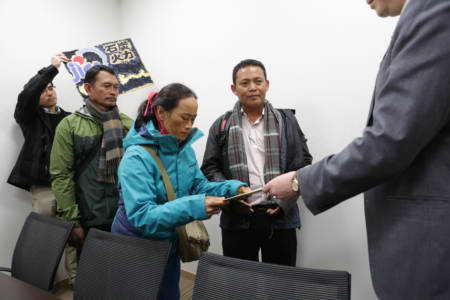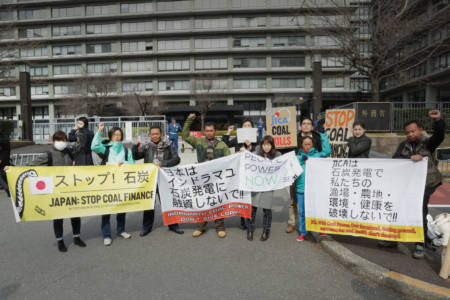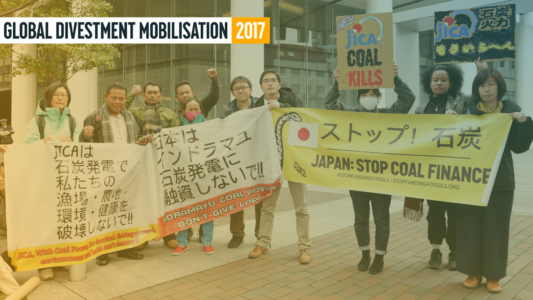Last week, a group of Indonesian residents and activists were in Japan to demand that the Japanese Government and banks do not finance the Indramayu coal power plant expansion project (1000MW) and Cirebon 2 coal-fired power plant project (1000MW), located in West Java. If completed, these planned projects would add a further 2000MW of polluting coal power capacity, further increasing hardship on local villagers and go against both Indonesia and Japan’s commitments to reduce carbon emissions in line with the Paris Agreement.
The Indramayu coal power plant expansion project builds on the existing coal power plant in Indramayu (originally funded by China), which has caused negative impacts on farmland, endangered children’s health, and polluted fishing grounds that villagers depend upon for their livelihood. In preparation for the expansion project, villagers have reported coercion in land acquisition processes, inconsistency in compensation measures as well as a lack of community consultation in the Environmental Impact Assessment process in violation of local laws. Despite these concerns, Japan’s foreign aid agency, the Japan International Cooperation Agency (JICA) is currently considering financing for the expansion project. Citing ongoing environmental and social issues as a result of the first power station, local villagers have expressed their strong opposition to JICA regarding the expansion project, requesting that JICA withdraw funding consideration for the project. To date, JICA has delivered no meaningful response to five formal letters sent by the community.
Cirebon 2 (1000MW) is another problematic coal-fired power expansion project located in West Java that the Japanese government, private companies, and banks are currently considering for finance. This would be built adjacent to the existing coal-fired power plant in Cirebon, also funded by Japan, which has resulted in negative impacts on local farmers, fisherman and unresolved land issues. Local villagers sent three formal objection letters to the Japan Bank for International Cooperation (JBIC) in 2016, however they have not received any formal response. Partner NGOs have also sent formal letters to the Japanese commercial banks (Mizuho Bank, Mitsubishi-Tokyo UFJ, Sumitomo Mitsui Banking Corporation) involved in the expansion project. The project is currently being challenged in court by a group of villagers who dispute the legality of the development project. Local activists are demanding that Japan help to shut down Cirebon 1, stop finance for Cirebon 2 and instead support renewable energy development in Indonesia.
The letter was supported by 280 organizations spanning over 47 countries.The letter also emphasized that funding into this project is “a fatal violation of the JICA environmental and social guidelines, which require ‘appropriate participation by affected people in the planning, implementation, and monitoring of resettlement action plans’ and ‘the disclosure of resettlement action plans’.”

Indonesian residents submitting formal letter to JICA official.

Indonesian residents and NGO groups protesting outside Ministry of Foreign Affairs in Tokyo.
The problem of Japan’s coal finance is two-fold. First, the Paris Agreement, to which Japan is a signatory, directs signatory countries to make efforts to keep global warming under 2 degrees Celsius. Reaching this goal means no new fossil fuel projects can be built. Second, coal combustion produces a great amount of pollutants, and the expansion of coal plants is doing more harm than good for those most most in need. This is not in line with the principles of overseas development assistance.
During the Global Divestment Mobilization planned for Japan this May, we will make a direct connection between the banks we entrust our money to and how our money is being used for unsustainable energy projects worldwide, which are damaging local livelihoods and worsening climate change. Emphasizing the power of our everyday choices, we will encourage people to divest their personal accounts from banks funding coal and fossil fuel projects overseas and pressure banks to take on more sustainable environmental policies.
One of the Indonesian residents visiting Japan pleaded that “I want Japanese people to think carefully about what kinds of harmful projects their money is being directed into.” This applies to all of us if we want to protect a safe climate and a livable planet.

